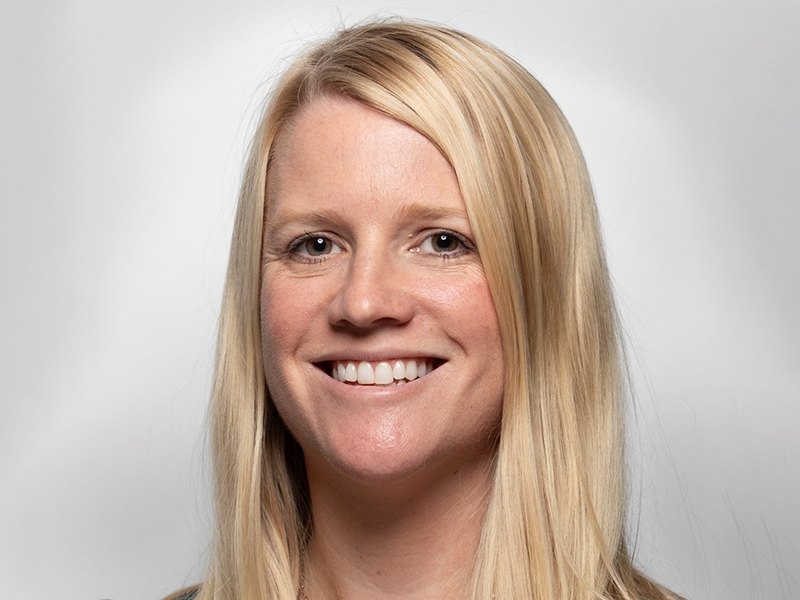
Agriculture is a good field for an engineer looking to have an impact on environmental sustainability, says Becca Muenich, associate professor of biological and agricultural engineering for the U of A System.
Muenich is a Northwest Arkansas native, so she knew a little about agriculture already. But following her bachelor's degree in biological engineering from the U of A in 2009, she completed her master's and doctoral degrees in agricultural and biological engineering at Purdue University.
"I never thought I'd learn so much about ag," Muenich said. "I tell my students all the time, if you want to make an impact, ag is a place to work on because it is the biggest water user and has the biggest land footprint. And I see all of that as an opportunity as an engineer to make this system we all rely on more sustainable."
Muenich returns to Arkansas from Arizona State University, where she was an assistant professor in the School for Sustainable Engineering and the Built Environment. She has more than 15 years of experience researching how environmental factors control water supplies and water quality in agricultural, urban and integrated systems.
In August, Muenich joined the Biological and Agricultural Engineering Department in the U of A College of Engineering and the Arkansas Agricultural Experiment Station, the research arm of the U of A System Division of Agriculture.
"Dr. Muenich's hire by the University of Arkansas is a rare opportunity, a coup for us, to have someone who not only has an amazing reputation in her field but also cares deeply about being in the area," said Terry Howell, head of the Biological and Agricultural Engineering Department. "Our students will be enriched by the depth of experiences she brings to the classroom and her research. She will be able to relate to our students in a unique way as an alumna of the department, and the variety of experiences outside of Arkansas will allow her to bring fresh ideas to our department as well. I could not be happier to have her join us."
Muenich is currently teaching the sustainable watershed engineering course for the Biological and Agricultural Engineering Department. She is also continuing research on projects carried over from Arizona State that are funded by the U.S. Army Corps of Engineers' Engineering with Nature program and the National Science Foundation's Science and Technologies for Phosphorus Sustainability program.
Most of her work is stakeholder driven with specific goals to enhance the long-term sustainability of agricultural and urban systems. For example, a research project she worked on looking at water quality in 16 states showed how clustering of smaller animal feeding operations was an important predictor for water quality outcomes at a watershed scale. Their paper, titled "The spatial organization of CAFOs and its relationship to water quality in the United States," showed that a cluster of smaller, unregulated operations has as much of an impact on the environment as the larger, regulated operations.
"This might make intuitive sense, that if you have a lot in a small amount of space, you end up overapplying manure in that space, but that's not really how the operations are regulated or incentivized to pay for conservation," Muenich said.
Conservation programs, she noted, are conducted voluntarily, and regulation is on an individual basis with a focus on animal numbers at a single site rather than an area within a watershed. Muenich's research helped provide insight on "the interconnectedness within the watersheds," she said, "which is going to be really important for the future of how we manage water quality."
In the future, Muenich aims to collaborate on research with several U of A and Division of Agriculture faculty members and teach a graduate-level course on water quality modeling. She also intends to develop a data science class for students of any discipline interested in environmental data.
Muenich completed a two-year postdoctoral fellowship at the University of Michigan Graham Sustainability Institute prior to her post at Arizona State. She earned her doctorate in agricultural and biological engineering from Purdue University in 2015. Muenich also served as a research scientist with the Sustainable Phosphorus Alliance and is an award-winning member of the American Society of Agricultural and Biological Engineers. She was inducted into the Arkansas Academy of Agricultural and Biological Engineers in 2020 and given an Early Career Alumni Award from the U of A in 2022 after receiving the Arizona State University Faculty Women's Association's Outstanding Faculty Mentor Award in 2021.
To learn more about Division of Agriculture research, visit the Arkansas Agricultural Experiment Station website: aaes.uada.edu. Follow on Twitter at @ArkAgResearch. To learn more about the Division of Agriculture, visit uada.edu. Follow us on Twitter at @AgInArk. To learn about extension programs in Arkansas, contact your local Cooperative Extension Service agent or visit www.uaex.uada.edu.
About the Division of Agriculture: The University of Arkansas System Division of Agriculture's mission is to strengthen agriculture, communities, and families by connecting trusted research to the adoption of best practices. Through the Agricultural Experiment Station and the Cooperative Extension Service, the Division of Agriculture conducts research and extension work within the nation's historic land grant education system. The Division of Agriculture is one of 20 entities within the University of Arkansas System. It has offices in all 75 counties in Arkansas and faculty on five system campuses. The University of Arkansas System Division of Agriculture offers all its Extension and Research programs and services without regard to race, color, sex, gender identity, sexual orientation, national origin, religion, age, disability, marital or veteran status, genetic information, or any other legally protected status, and is an Affirmative Action/Equal Opportunity Employer.
Topics
Contacts
John Lovett, project/program specialist
Agricultural Communication Services
479-763-5929,